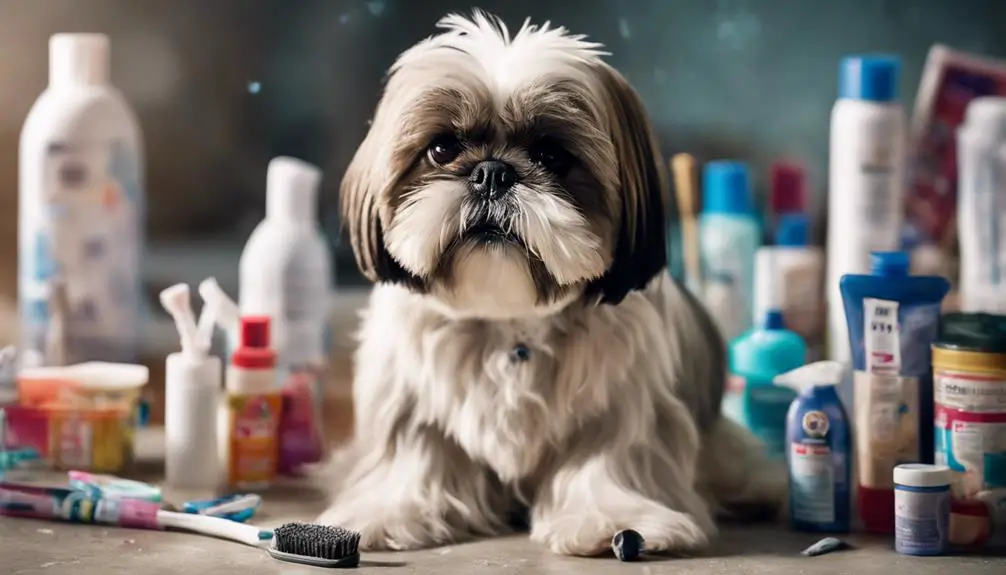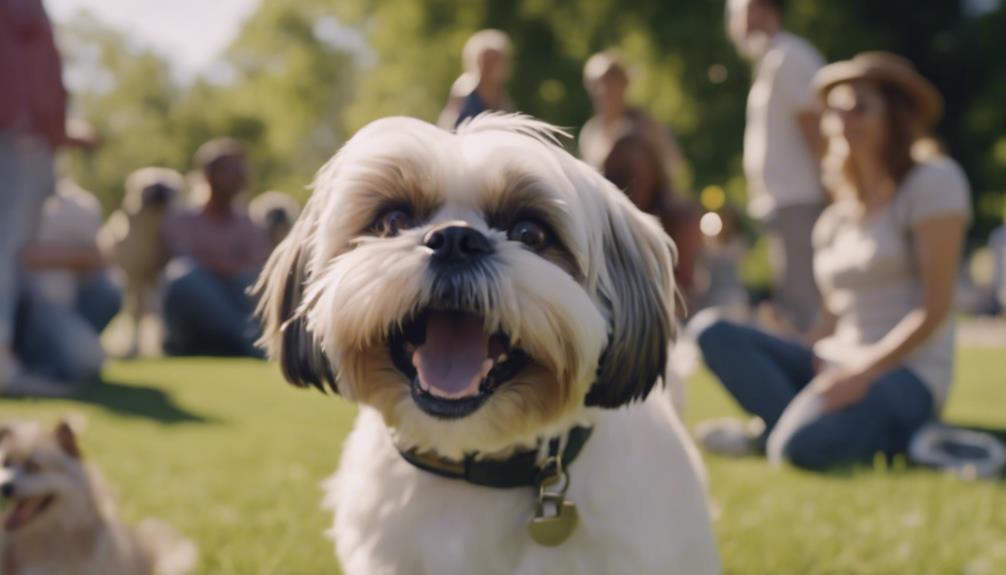As a Shih Tzu owner, you're likely well aware of how easily these charming dogs can wrap you around their little paws. But are you equally aware of the habits that can either enhance or impair their well-being? You might be doing everything right, from consistent grooming to regular vet visits, but are there areas where you're inadvertently slipping? Perhaps you're overindulging them with treats or not setting clear boundaries? Let's unpack these habits together, and you might discover some adjustments that could greatly improve your furry friend's quality of life. What do you think might be your blind spot?
Recognizing Overfeeding Signs

You can spot signs of overfeeding in your Shih Tzu by noting any sudden weight gain or decreased activity levels. This breed is prone to obesity, which exacerbates health issues like joint pain, respiratory problems, and diabetes. Watch for a less defined waist and a reluctance to move or play as usual. These are key indicators that you might be feeding them too much.
Another sign is changes in eating habits. If your Shih Tzu starts leaving food in their bowl when they previously finished meals, it could suggest they're getting extra calories elsewhere—perhaps from treats or table scraps. Consistently monitor their intake to make sure they're not consuming more than their daily caloric need. The ideal amount varies depending on their age, weight, and activity level, but generally, an adult Shih Tzu requires about ½ to 1 cup of high-quality dog food divided into two meals per day.
Lastly, check their stool. Overfed dogs often produce more and softer stools. If you're noticing that your Shih Tzu's bowel movements have changed, it might be time to reassess their diet.
Consulting with a vet can provide tailored guidance on the appropriate portion sizes for your pet's specific health profile.
Importance of Regular Grooming

Regular grooming is essential for maintaining your Shih Tzu's healthy skin and coat. This breed's dense double coat requires frequent brushing to prevent matting and to distribute natural skin oils, which keep the coat shiny and healthy. You should brush your Shih Tzu at least three times a week, using a bristle brush for the outer coat and a fine-toothed comb for the undercoat. This routine not only enhances the appearance but also stimulates blood flow to the skin, promoting healthier skin.
Bathing your Shih Tzu too frequently can strip essential oils from the skin and lead to dryness and irritation. Aim for a bath every three to four weeks using a mild, dog-specific shampoo. Make sure you thoroughly rinse the shampoo to prevent residue buildup, which can cause itching and discomfort.
Trimming around the eyes and feet is also important, as it prevents infections caused by hairs poking the eyes or debris getting trapped in the paws. Regularly check and clean the ears to avoid wax buildup that can lead to infections.
Grooming isn't just about aesthetics; it's a crucial part of your Shih Tzu's health regimen, impacting overall well-being.
Neglecting Dental Care

Neglecting dental care can lead to significant health issues for your Shih Tzu, including gum disease and tooth loss. Dental problems in Shih Tzus aren't just about bad breath; they can lead to more serious health complications, such as infections that might spread to vital organs like the heart and kidneys.
It's important to start dental hygiene practices early, as plaque starts to build up on the teeth and can harden into tartar within days.
You should brush your Shih Tzu's teeth at least two to three times a week. Use a toothbrush designed for dogs and a vet-approved toothpaste. Never use human toothpaste, as it contains ingredients like xylitol, which is toxic to dogs.
Besides brushing, dental chews and toys can help reduce plaque build-up, but they don't replace the need for regular brushing.
Annual dental check-ups with your veterinarian are also essential. These visits allow for the professional cleaning of your pet's teeth and the early detection of potential problems.
Your vet can show you how to properly care for your Shih Tzu's teeth and recommend specific products or diets that help maintain dental health. Remember, maintaining your dog's dental care isn't just about aesthetics—it's a fundamental part of their overall health.
Consistency in Training

Consistent training is vital for your Shih Tzu to develop and maintain obedient behavior. Training isn't just about teaching tricks; it's about establishing a communication pathway between you and your pet. When you're inconsistent, it confuses your Shih Tzu, making it difficult for them to understand what you expect. This inconsistency can lead to behavioral problems and a breakdown in the trust and bond between you both.
You must set a regular schedule for training sessions. These should ideally be short, about 10-15 minutes long, to keep your Shih Tzu engaged and not overwhelmed. Consistency in commands is important; if you use “sit” one day, then switch to “sit down” the next, you're not reinforcing the command effectively. Always use the same words and reward system to enhance learning and recall.
Furthermore, it's important that all family members involved in your Shih Tzu's training adhere to the same rules and commands. This uniformity prevents your pet from receiving mixed signals, which can hinder their learning process.
Regular, consistent training sessions will make certain that your Shih Tzu develops a clear understanding of expected behaviors, leading to a well-behaved and happier pet.
Providing Enough Exercise

Ensuring your Shih Tzu gets enough exercise is important for their physical and mental health. As a compact breed, your Shih Tzu doesn't require extensive physical activity, but regular exercise is essential to prevent obesity, which can lead to more severe health issues like joint pain, heart disease, and diabetes.
Ideally, aim for about 20 to 30 minutes of walking each day. You can split this into two sessions to keep them engaged and not overwhelmed.
Incorporate various forms of physical activities to cater to their needs. While walking is a staple, engaging in play sessions with toys can stimulate their mind and body simultaneously. Always monitor their breathing and make sure they aren't overexerting, as Shih Tzus can experience respiratory problems due to their brachycephalic nature.
Besides regular walks, consider agility training which enhances their nimbleness and mental acuity. However, always tailor these sessions to be less strenuous, focusing on enjoyment rather than intense competition.
Lastly, it's important to maintain a consistent exercise schedule. Regular physical activity not only ensures good health but also helps in establishing a routine that your Shih Tzu can anticipate and enjoy.
Socializing Your Shih Tzu

Socializing your Shih Tzu from an early age is vital for their behavioral development and ability to interact confidently with other animals and people. Introducing your puppy to a variety of environments, sounds, and experiences can greatly reduce fear and anxiety in unfamiliar situations. It's important to start this process between 3 to 14 weeks of age, a period known as the socialization window. During this time, their brains are highly receptive to learning about their surroundings, which sets the foundation for their future temperament and behavior.
You should expose your Shih Tzu to different people, including children, and other animals, ensuring these interactions are positive and controlled. Regular visits to dog-friendly parks and participation in puppy socialization classes can provide valuable social experiences. However, make sure vaccinations are up-to-date before exposing your Shih Tzu to other dogs and public spaces to prevent disease transmission.
Neglecting early socialization can lead to a dog that's fearful, aggressive, or overly shy, impacting their quality of life and your ability to take them to various environments comfortably. Hence, it's imperative to dedicate time and effort to properly socialize your Shih Tzu, ensuring they grow into well-adjusted, sociable dogs.
Avoiding Frequent Spoiling

Many Shih Tzu owners often indulge their pets, but it's vital to avoid excessive spoiling to maintain healthy behavior. Overindulgence can lead to several behavioral issues such as possessiveness, aggression, and poor social skills. When you constantly yield to your Shih Tzu's demands, you're inadvertently reinforcing negative behaviors.
It's important to set clear boundaries. For instance, if you allow your Shih Tzu on the couch without invitation, you might find it challenging to reclaim your space when needed. Instead, train your pet to understand that certain areas are off-limits unless permitted. This training should be consistent and reinforced with positive rewards when they comply.
Moreover, spoiling your Shih Tzu with treats can contribute to obesity, which is a significant health concern. Treats shouldn't constitute more than 10% of their daily caloric intake. Always opt for healthy treats and integrate them as part of a balanced diet.
Additionally, excessive pampering can prevent your Shih Tzu from developing coping skills. It's healthy for them to experience mild stressors like staying alone for short periods or dealing with minor frustrations. These experiences help them adapt and grow emotionally resilient.
Conclusion
As a Shih Tzu owner, it's vital you recognize overfeeding signs, maintain grooming, and prioritize dental care.
Consistent training and adequate exercise are essential for their health, as is proper socialization.
Avoid the pitfalls of overindulging and excessive treat-giving, which can lead to behavioral issues and emotional dependence.
By adopting the best practices and steering clear of detrimental habits, you guarantee your Shih Tzu leads a happy, balanced, and healthy life.


